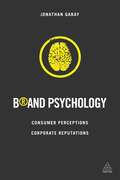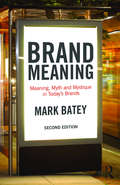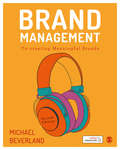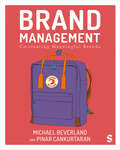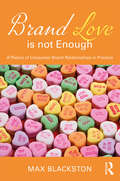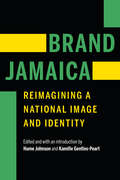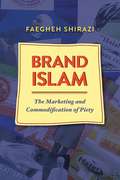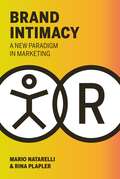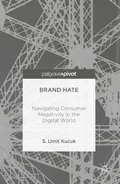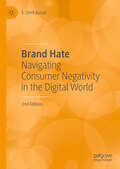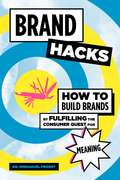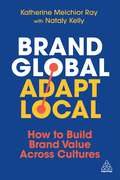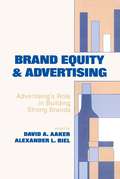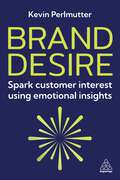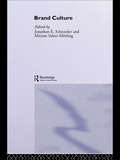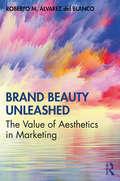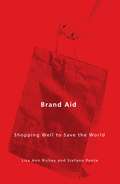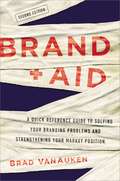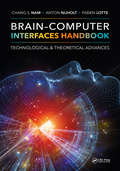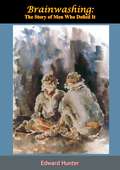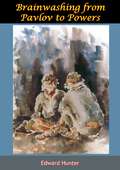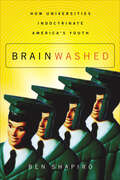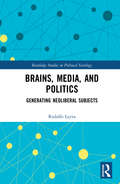- Table View
- List View
Brand Psychology
by Jonathan GabayWhy do we trust some brands more than others? How important is integrity for a brand's survival? How can brand confidence be rebuilt during a crisis? Using both new and classic insights from social psychology, cognitive psychology and neuroscience, Brand Psychology reveals the hidden processes behind why certain brands command our loyalty, trust and - most importantly - disposable income. Reputation management authority Jonathan Gabay takes readers on a tour of the corporate, political, and personal brands whose understanding of consumer psychology has either built or broken them.Suitable for marketing, branding and PR professionals, reputation management specialists and students, Brand Psychology takes examples from e-cigarette legislation, the iPhone 5S's fingerprint ID technology, Barclays' branded bikes and the London 2012 Olympics, Miley Cyrus and the UK National Health Service's big data to reveal how to build a meaningful brand that resonates with the public.
Brand Meaning: Meaning, Myth and Mystique in Today’s Brands
by Mark BateyThis second edition of Brand Meaning lays out new territory for the understanding of how brands both acquire and provide meaning. The author draws on his experience with leading international companies to propose a compelling framework for the conscious and unconscious ways in which people connect with products and brands. Revised and updated, it contains contemporary as well as classic examples of brand meaning in practice from various countries, and expands on the theory, methods and applications of brand meaning. The book’s multidisciplinary approach and concise yet comprehensive content makes it an ideal supplemental reader for undergraduate, graduate, and MBA courses, as well as valuable reading for practitioners in the fields of marketing, advertising and consumer research. For more information, visit www.brandmeaning.com.
Brand Management: Co-creating Meaningful Brands
by Michael BeverlandPresenting the basics of brand management, the book provides both a theoretical and practical guide to brands, placing emphasis on the theory that the consumer is a co-creator in a brand′s identity. In a world in which social media and inclusive digital platforms have increased customer engagement, the role of brands and branding has changed. The line between the producer and the consumer has become blurred; consumers are no longer the recipients of brand identity, but the co-creators, playing a significant role in shaping new products and systems. Case studies include the Canterbury Crusaders, KVD Beauty, Kodak, Yamaha, Ottobock and Holland′s rebrand as The Netherlands.
Brand Management: Co-creating Meaningful Brands
by Michael BeverlandPresenting the basics of brand management, the book provides both a theoretical and practical guide to brands, placing emphasis on the theory that the consumer is a co-creator in a brand′s identity. In a world in which social media and inclusive digital platforms have increased customer engagement, the role of brands and branding has changed. The line between the producer and the consumer has become blurred; consumers are no longer the recipients of brand identity, but the co-creators, playing a significant role in shaping new products and systems. Case studies include the Canterbury Crusaders, KVD Beauty, Kodak, Yamaha, Ottobock and Holland′s rebrand as The Netherlands.
Brand Management: Co-creating Meaningful Brands
by Michael Beverland Pinar CankurtaranThis popular textbook introduces students to contemporary brand management and innovation with a focus on how companies and consumers are interacting and co-creating brands today. The latest edition continues to provide equal focus on theory and practice with all new case studies and examples from brands around the globe to help show the wide range and diversity of brands and consumers today. These include Glossier, Lovehoney, Whisper, Shinola Detroit, Trung Nguyen, Shatta Wale, Tony’s Chocolonely. Also included are updated research references and online resources, as well as a brand-new chapter on the creative aspects of branding from naming to logos and experiences. This textbook is essential reading for all students studying branding and brand management at university level. Michael Beverland is Professor of Brand Marketing at University of Sussex Business School. Pinar Cankurtaran is Assistant Professor of Brand Strategy at the Faculty of Industrial Design Engineering, Delft University of Technology.
Brand Management: Co-creating Meaningful Brands
by Michael Beverland Pinar CankurtaranThis popular textbook introduces students to contemporary brand management and innovation with a focus on how companies and consumers are interacting and co-creating brands today. The latest edition continues to provide equal focus on theory and practice with all new case studies and examples from brands around the globe to help show the wide range and diversity of brands and consumers today. These include Glossier, Lovehoney, Whisper, Shinola Detroit, Trung Nguyen, Shatta Wale, Tony’s Chocolonely. Also included are updated research references and online resources, as well as a brand-new chapter on the creative aspects of branding from naming to logos and experiences. This textbook is essential reading for all students studying branding and brand management at university level. Michael Beverland is Professor of Brand Marketing at University of Sussex Business School. Pinar Cankurtaran is Assistant Professor of Brand Strategy at the Faculty of Industrial Design Engineering, Delft University of Technology.
Brand Love is not Enough: A Theory of Consumer Brand Relationships in Practice
by Max BlackstonHow would you feel about a bank that handled all of your financial needs efficiently, but made you feel like a dummy? In a relationship between two people, what the other person thinks of you (or what you believe they think of you) exerts great influence on the quality of your relationship. The same is true for your relationship with brands. In this trailblazing book, Blackston extends his theory on consumer brand relationships introduced in the 1990s. He introduces a new construct called "brand's attitude," which complements the idea of brand image and introduces a typology of consumer relationships that is richer and more varied than the familiar concept of brand love. This construct describes more fully the two-way street that exists between consumers and brands, and fills a crucial gap in traditional branding literature in explaining consumers’ brand purchasing and usage behavior. Drawing on numerous actual examples and cases from a variety of different industries, and supported by 30 years of consumer data, Brand Love is not Enough should be on the shelf of any serious marketer or student of branding.
Brand Jamaica: Reimagining a National Image and Identity
by Kamille Gentles-Peart Hume JohnsonBrand Jamaica is an empirical look at the postindependence national image and branding project of Jamaica within the context of nation-branding practices at large. Although a tiny Caribbean island inhabited by only 2.8 million people, Jamaica commands a remarkably large presence on the world stage. Formerly a colony of Britain and shaped by centuries of slavery, violence, and plunder, today Jamaica owes its popular global standing to a massively successful troika of brands: music, sports, and destination tourism. At the same time, extensive media attention focused on its internal political civil war, mushrooming violent crime, inflation, unemployment, poverty, and abuse of human rights have led to perceptions of the country as unsafe.Brand Jamaica explores the current practices of branding Jamaica, particularly within the context of postcoloniality, reconciles the lived realities of Jamaicans with the contemporary image of Jamaica projected to the world, and deconstructs the current tourism model of sun, sand, and sea. Hume Johnson and Kamille Gentles-Peart bring together multidisciplinary perspectives that interrogate various aspects of Jamaican national identity and the dominant paradigm by which it has been shaped.
Brand Islam: The Marketing And Commodification Of Piety
by Faegheh ShiraziFrom food products to fashions and cosmetics to children’s toys, a wide range of commodities today are being marketed as “halal” (permitted, lawful) or “Islamic” to Muslim consumers both in the West and in Muslim-majority nations. <P><P>However, many of these products are not authentically Islamic or halal, and their producers have not necessarily created them to honor religious practice or sentiment. Instead, most “halal” commodities are profit-driven, and they exploit the rise of a new Islamic economic paradigm, “Brand Islam,” as a clever marketing tool. <P><P> Brand Islam investigates the rise of this highly lucrative marketing strategy and the resulting growth in consumer loyalty to goods and services identified as Islamic. Faegheh Shirazi explores the reasons why consumers buy Islam-branded products, including conspicuous piety or a longing to identify with a larger Muslim community, especially for those Muslims who live in Western countries, and how this phenomenon is affecting the religious, cultural, and economic lives of Muslim consumers. <P><P>She demonstrates that Brand Islam has actually enabled a new type of global networking, joining product and service sectors together in a huge conglomerate that some are referring to as the Interland. <P><P>A timely and original contribution to Muslim cultural studies, Brand Islam reveals how and why the growth of consumerism, global communications, and the Westernization of many Islamic countries are all driving the commercialization of Islam.
Brand Intimacy: A New Paradigm in Marketing
by Mario Natarelli Rina PlaplerFrom Patagonia to Apple, Whole Foods to New Balance, we love our favorite products--and, by extension, the companies that provide them. The emotional connections we form with our beloved brands and services are important relationships--relationships that are potentially worth billions. In the fast-paced, constantly-changing world of the modern marketplace, brands must adapt or perish—strategies, methods, and techniques must evolve to remain effective and relevant. Are you using yesterday’s thinking for tomorrow’s challenges? Brand Intimacy details ways to build better marketing through the cultivation of emotional connections between brand and consumer. The book provides lessons for marketers and business leaders alike who are seeking to understand these ultimate brand relationships and the opportunities they represent. Divided into three sections, Brand Intimacy starts with Context and Understanding. This explains today’s marketing landscape, the effects of technology, consumer behaviors and the advancements around decision making. Through research we discovered that people form relationships with brands the same way they develop relationships with other people. This section provides guidance on how to think about complimentary concepts such as loyalty, satisfaction and brand value. We then explore and compare established approaches and methodologies and showcase why intimacy is a compelling new and enhanced opportunity to build your brand or market your business. The second section, Theory and Model reveals and dimensions the brand intimacy model and dissects it into steps to help you better factor it into your marketing approaches or frameworks. Here you will learn the core concepts and components that are essential to build bonds and the role emotion can play to help you achieve greater customer engagement. You can also review the rankings of the best brands in terms of Brand Intimacy. A summary of our annual research reveals the characteristics of best performers, the most intimate industries, and differences based on geography, age, gender and income. By examining the top intimate brands, we reveal and decode the secrets of the bonds they form with their customers. The third section is Methods & Practice, this details the economic benefits and advantages of a strategy that factors Brand Intimacy. Intimate brands are proven to outperform the Fortune 500 and Standards and Poors’ index of brands. Intimate brands create more revenue and profit and last longer. Consumers are also willing to pay more for a brand they are more intimate with. Conversely, we also explore a series of brand failures and lessons learned to help you avoid common pitfalls in brand management. We articulate the steps to build a more intimate brand as well as share a glimpse on the future where software will play a more important role in brand building. The book outlines a proprietary digital platform that we use to help manage and enable intimacy through collaboration, simulators and real-time tracking of emotions. Business and marketing owners face an increasing difficult task to build brands that rise above the clutter, engage more and grow. Brand Intimacy explains how to better measure, build and manage enduring brands. Brands that are built to inspire as well as profit. Written by experienced marketers and backed by extensive research, Brand Intimacy rewrites the rulebook on how to establish and expand your marketing. The book is equal parts theory, research and practice, the result of 7 year journey and a new marketing paradigm for the modern marketer.
Brand Hate: Navigating Consumer Negativity in the Digital World
by S. Umit KucukThis book focuses on the concept of "brand hate" and consumer negativity in today's digital markets. It explores the emotional detachment consumers generate against valued brands and how negative experiences affect their and other consumers' loyalty. In today's world, it is almost impossible not to run into hateful language about companies and their brands in digital consumption spaces. Consumer hostility and hate is not hidden and silent but is now openly shared on many online anti-brand websites, consumer social networking sites, and complaint and review boards as a result of the Internet's democratic architecture. The book defines consumer brand hate and discusses its dimensions, antecedents, and consequences as well as the semiotics and legality of such brand hate activities based on current brand dilution arguments. It describes the situations which lead to anti-branding and how consumers choose to express their dissatisfaction with a company on individual and social levels. Finally, it provides strategic perspectives on how to handle such situations to achieve better functioning markets for scholars and practitioners in marketing, psychology, and consumer behavior.
Brand Hate: Navigating Consumer Negativity in the Digital World
by S. Umit KucukThis book focuses on the concept of “brand hate” and consumer negativity in today’s digital markets. It explores the emotional detachment consumers generate against valued brands and how negative experiences affect their and other consumers' loyalty. It is almost impossible not to run into hateful language about companies and their brands in today’s digital consumption spaces. Consumer hostility and hate is not hidden and silent anymore but is now openly shared on many online anti-brand websites, consumer social networking sites, and complaint and review boards. The book defines consumer brand hate and discusses its dimensions, antecedents, and consequences as well as the semiotics and legality of such brand hate activities based on current brand dilution arguments. It describes the situations which lead to anti-branding and how consumers choose to express their dissatisfaction with a company on individual and social levels. This newly updated edition discusses recent research findings from brand hate literature with new cases and extended managerial analysis. Thus, the book provides strategic perspectives on how to handle such situations to achieve better functioning markets for scholars and practitioners in marketing, psychology, and consumer behavior.
Brand Hacks: How to Build Brands by Fulfilling the Consumer Quest for Meaning
by Dr. Emmanuel Probsteconomics;consumer behavior;advertising;branding;brand advertising;advertising campaigns;consumer psychology;marketing;market research;digital marketing;fortune 500;business;business development;business analysis;ipsos;dr emmanuel probst; Every year, brands spend over $560 billion (and counting) to convince us to buy their products. Yet, as consumers we have become insensitive to most advertising. We easily forget brands and may switch to another product on a whim. There are ways for brands to break this cycle. Brands that succeed are the ones that help us find meaning. In this process, the brands become meaningful in and of themselves. Brand Hacks takes you on an exploratory journey, revealing why most advertising campaigns fail and examining the personal, social, and cultural meanings that successful brands bring to consumers&’ everyday lives. Most importantly, this book will show you how to use simple brand hacks to create and grow brands that deliver meaning even with a limited budget. Brand Hacks is supported by in-depth research in consumer psychology, interviews with industry-leading marketers, and case studies of meaningful brands, both big and small.
Brand Global, Adapt Local: How to Build Brand Value Across Cultures
by Nataly Kelly Katherine Melchior RayBuilding global brands provides companies with access to new markets, new opportunities and new ideas that can stimulate innovation and diversify revenue streams. However, with new opportunities comes additional challenges that marketers need to navigate in order to build an international brand. If a brand wants to thrive in an international market, it needs to understand the different consumers and the nuances of the cultures in which they live. The best brands in the world do this by remaining relentlessly curious about their customers and their markets, immersing themselves in the culture and embracing new and different ways of seeing, understanding and being. Learn how to develop this global mindset and how to build this into your marketing strategy from some of the world's leading global brands such as Nike, LVMH, Nestlé, Shiseido, Natura and Marriott. This book explores the challenges these brands faced across international markets and how they balance remaining true to their brand values with creating local resonance.Covering everything from how applying cultural understanding to interpreting data delivers exceptional consumer insight to how you can localize campaigns without losing the core brand identity, this book delivers all you need to know about scaling a brand globally packed full of powerful insight from leading marketers.
Brand Equity & Advertising: Advertising's Role in Building Strong Brands (Advertising And Consumer Psychology Ser.)
by David A. Aaker Alexander L. BielThe tenth annual Advertising and Consumer Psychology Conference held in San Francisco focused on branding -- a subject generating intense interest both in academia and in the "real world." The principle theory behind these conferences is that much can be gained by joining advertising and marketing professionals with academic researchers in advertising. Professionals can gain insight into the new theories, measurement tools and empirical findings that are emerging, while academics are stimulated by the insights and experience that professionals describe and the research questions that they pose. This book consists of papers delivered by experts from academia and industry discussing issues regarding the role of advertising in the establishment and maintenance of brand equity -- making this volume of interest to advertising and marketing specialists, as well as consumer and social psychologists.
Brand Desire: Spark Customer Interest Using Emotional Insights
by Kevin PerlmutterIgnite customer enthusiasm for your brand and open new opportunities for business growth, by discovering and addressing what matters most to your customers. Written by brand strategy expert Kevin Perlmutter, this book gives you the tools to accelerate your brand growth by delivering a detailed strategy playbook that puts emotional insight at the center of how brands attract and retain customers. At the heart of this book lies a simple yet powerful premise: brand leaders who understand and address the emotional motivations of their customers lead the brands that thrive. Drawing on insights from behavioral science that rarely feature in brand leadership initiatives, this modern-day guide to brand strategy will help business and brand leaders move beyond the limitations of traditional brand strategy. Brand Desire shares real-world examples of how this approach has been put into practice through the eyes of leaders who have benefited from using it, from companies such as the AT&T Performing Arts Center, bulletproof material manufacturer Sundless, social services nonprofit Rise, the world's leading corporate DJ booking service Scratch Event DJs, IT managed service provider ServiceByte, and supply chain software company Blue Ridge. It also shares examples of emotionally intelligent brands such as Lemonade Insurance, Trader Joe's, Zappos, Cutco, Bose, and Ben & Jerry's. Reading this book will enable you to understand how you can put emotional intelligence at the center of your strategy to spark brand desire and strengthen customer-brand connections.
Brand Culture
by Jonathan E. Schroeder Miriam Salzer-MörlingThis fascinating book shows that neither managers nor consumers completely control branding processes – cultural codes constrain how brands work to produce meaning. Placing brands firmly within the context of culture, it investigates these complex foundations. Topics covered include: the role of consumption brand management corporate branding branding ethics the role of advertising. This excellent text includes case studies of iconic international brands such as LEGO, Nokia and Ryanair, and analysis by leading researchers including John M.T. Balmer, Stephen Brown, Mary Jo Hatch, Jean-Noël Kapferer, Majken Schultz, and Richard Elliott. An outstanding collection, it will be a useful resource for all students and scholars interested in brands, consumers and the broader cultural landscape that surrounds them.
Brand Beauty Unleashed: The Value of Aesthetics in Marketing
by Roberto M. Álvarez del BlancoThis book presents an in-depth, careful study of our understanding of the concept of beauty in everyday objects and its impact on markets and brands. Moving beyond artistic notions of beauty, it demonstrates how beauty is an asset that can be leveraged in the marketplace. Traditionally, beauty has been examined in relation to its influence on painting, sculpture, literature, music, and architecture. However, its value and power in the marketplace is understudied. Álvarez del Blanco provides a systematic analysis of beauty in commonplace objects and brands, drawing on cutting-edge research at the intersection of marketing and neurosciences. Through examining the neuroscientific evidence for how the brain processes beauty, the author articulates the implications this may have on marketing and brand management. He also offers a glimpse of how beauty may evolve, and its marketing implications for firm strategy in the coming decades. Written by a recognized authority in marketing and brand strategy, Brand Beauty Unleashed gives students with an interest in marketing, consumer behavior, branding, and neuromarketing an exciting new perspective on this intangible asset.
Brand Aid: Shopping Well to Save the World (A Quadrant Book)
by Stefano Ponte Lisa Ann Richey&“Has there ever been a better reason to shop?&” asks an ad for the Product RED American Express card, telling members who use the card that buying &“cappuccinos or cashmere&” will help to fight AIDS in Africa. Cofounded in 2006 by the rock star Bono, Product RED has been a particularly successful example of a new trend in celebrity-driven international aid and development, one explicitly linked to commerce, not philanthropy. In Brand Aid, Lisa Ann Richey and Stefano Ponte offer a deeply informed and stinging critique of &“compassionate consumption.&” Campaigns like Product RED and its precursors, such as Lance Armstrong&’s Livestrong and the pink-ribbon project in support of breast cancer research, advance the expansion of consumption far more than they meet the needs of the people they ostensibly serve. At the same time, such campaigns sell both the suffering of Africans with AIDS (in the case of Product RED) and the power of the average consumer to ameliorate it through familiar and highly effective media representations. Using Product RED as its focal point, this book explores how corporations like American Express, Armani, Gap, and Hallmark promote compassionate consumption to improve their ethical profile and value without significantly altering their business model, protecting themselves from the threat to their bottom lines posed by a genuinely engaged consumer activism. Coupled with the phenomenon of celebrity activism and expertise as embodied by Bono, Richey and Ponte argue that this &“causumerism&” represents a deeply troubling shift in relief efforts, effectively delinking the relationship between capitalist production and global poverty.
Brand Aid: A Quick Reference Guide to Solving Your Branding Problems and Strengthening Your Market Position
by Brad VanAukenBrand managers, marketers, and executives have long turned to the trusted principles in Brand Aid to troubleshoot their branding problems.A catchy business name and a smart logo may get you a few clicks, but to create a sustaining image for your organization and build continual success will require the perfect branding statement. The essence of an organization begins with establishing its brand; therefore, it is essential to get it right.With over 30 years of experience building world-class brands, branding expert Brad Vanauken covers topics ranging from research and positioning to brand equity management and architecture strategy. This invaluable guide has collected illuminating case studies, best practices, and the latest research to offer invaluable advice on every aspect of brand management, including:The 6 most powerful sources of brand differentiation5 elements that trigger brand insistenceTurning brand strategy into advertisingOnline brandingSocial responsibility, sustainability, and storytelling60 nontraditional marketing techniquesAn organization cannot afford to get their branding wrong. With the treasure trove of techniques, templates, and rules of thumb found in Brand Aid, it won&’t!
Brain–Computer Interfaces Handbook: Technological and Theoretical Advances
by Anton Nijholt Fabien Lotte Chang S. NamBrain–Computer Interfaces Handbook: Technological and Theoretical Advances provides a tutorial and an overview of the rich and multi-faceted world of Brain–Computer Interfaces (BCIs). The authors supply readers with a contemporary presentation of fundamentals, theories, and diverse applications of BCI, creating a valuable resource for anyone involved with the improvement of people’s lives by replacing, restoring, improving, supplementing or enhancing natural output from the central nervous system. It is a useful guide for readers interested in understanding how neural bases for cognitive and sensory functions, such as seeing, hearing, and remembering, relate to real-world technologies. More precisely, this handbook details clinical, therapeutic and human-computer interfaces applications of BCI and various aspects of human cognition and behavior such as perception, affect, and action. It overviews the different methods and techniques used in acquiring and pre-processing brain signals, extracting features, and classifying users’ mental states and intentions. Various theories, models, and empirical findings regarding the ways in which the human brain interfaces with external systems and environments using BCI are also explored. The handbook concludes by engaging ethical considerations, open questions, and challenges that continue to face brain–computer interface research. Features an in-depth look at the different methods and techniques used in acquiring and pre-processing brain signals, extracting features, and classifying the user's intention Covers various theories, models, and empirical findings regarding ways in which the human brain can interface with the systems or external environments Presents applications of BCI technology to understand various aspects of human cognition and behavior such as perception, affect, action, and more Includes clinical trials and individual case studies of the experimental therapeutic applications of BCI Provides human factors and human-computer interface concerns in the design, development, and evaluation of BCIs Overall, this handbook provides a synopsis of key technological and theoretical advances that are directly applicable to brain–computer interfacing technologies and can be readily understood and applied by individuals with no formal training in BCI research and development.
Brainwashing: The Story Of Men Who Defied It
by Edward HunterFirst published in 1956, this book by U.S. journalist and intelligence agent Edward Hunter comprises dramatic first-hand accounts from Korean War veterans who survived P.O.W. camps and Communist attempts to brainwash them."The new word brainwashing entered our minds and dictionaries in a phenomenally short time. [...] The reason the word was picked up so quickly was that it was not just a clever synonym for something already known, but described a strategy that had yet no name. [...] The word came out of the sufferings of the Chinese people. Put under a terrifying combination of subtle and crude mental and physical pressures and tortures, they detected a pattern and called it brainwashing. [...] What they had undergone was more like witchcraft, with its incantations, trances, poisons, and potions, with a strange flair of science about it all, like a devil dancer in a tuxedo, carrying his magic brew in a test tube."A true and terrible story of the men who endured and defied the most diabolical red torture--the war book you will never forget."A fascinating document."--Chicago Tribune
Brainwashing from Pavlov to Powers
by Edward HunterIntelligence agency veteran and journalist Edward Hunter shares the experiences of men he interviewed who were subject to brainwashing as prisoners in totalitarian communist societies.A shocking yet informative expose of the history and techniques of brainwashing by communist military and security services, this book commences by delving into the origins of the practice. Ivan Pavlov, a vaunted scientist in the Soviet Union, was an unwitting aide to the process—his experiments on animals, and the discoveries he made therein, would form the basis of the incarceration and interrogation methods used in multiple communist states. The object of such procedures was to break down a person's ego, and rebuild it in the form of an unwavering supporter to communist ideology.Chapter by chapter, we are given a detailed guide to the physical and mental manipulations which comprise brainwashing. Supporting this information are multiple interviews and accounts of prisoners who lived to tell of their ordeals. Some of these men are intellectuals, persecuted for their mental prowess, while others are captured soldiers. Many retained their sanity by discovering ways to subvert the process—the harsh interviews, replete with threats, were rebuffed. In short, the playbook of the brainwasher is exposed as having exploitable flaws and weaknesses.Although the subject is by nature grim and dark, Edward Hunter's narration is interspersed with humorous narratives. The experiences of British and American POWs during the Korean War are humorous; to the bafflement of their guards, men would feign insanity and pretend to be hallucinating, be it through having an illusory girlfriend or riding a non-existent bicycle. The sense of camaraderie did much to strengthen the resolve of these soldiers, in spite of the adverse conditions of their camp.-Print ed.
Brainwashed: How Universities Indoctrinate America's Youth
by Ben ShapiroBrainwashed is the explosive exposé of the leftist agenda at work in today's colleges, revealed by firebrand Ben Shapiro—syndicated columnist, podcaster, radio show host, and one of today's most exciting conservative voices—who&’s been on the front lines of the battle for America's young minds. This book proves once and for all that so-called higher education continues to sink lower and lower into the depths of liberal madness as close-minded professors turn their students into socialists, atheists, race-baiters, and sex-crazed narcissists.In this book, author Ben Shapiro asks three critical questions:Why are universities so biased?Why do students take their professors at face value?What can we do to stop it?In addition to outlining practical solutions as part of a multi-pronged strategy to deal with this problem, Brainwashed encourages students toconsider the motives of their professors;pay attention to how professors use facts and editorialize during lectures; andask questions, encourage debate, and think before buying into a professor&’s mindset.Praise for Brainwashed:"Ben Shapiro's writing is smart, informative, and incisive. He is wise beyond his years without losing the refreshing fearlessness of youth." Ann Coulter, bestselling author of High Crimes and Misdemeanors, Slander, and Treason"In Brainwashed, Shapiro tells the truth—that universities are forums of left-liberal indoctrination, where dissent is discouraged and penalized, with more restrictions on free speech rather any other part of American society. Parents who are paying for tuition might want to take note, and see what their hard-earned money is paying for." Michael Barone, U.S. News & World Report and co-author of The Almanac of American Politics"Welcome to P.C. 101. In this trenchant insider's expose, Ben Shapiro bears witness to the modern American campus freak show. You'll get up close and personal with the Marxist loons, moral relativists, multicultural zealots, and American-haters who are corrupting young minds. Brainwashed reveals the ignominious lows to which higher education has sunk. Get deprogrammed. Buy this book!" Michelle Malkin, nationally syndicated columnist and author of Invasion"Sharp thinking, tight writing, crazy-but-true stories: Ben Shapiro sees campus brainwashing and raises a national protest. This is a good book to give both freshmen who need warning and voters/alumni who need to take action." Dr. Marvin Olasky, University of Texas professor and editor-in-chief of World magazine"A worthy successor to God and Man at Yale and Harvard Hates America in exploring the belly of the academic beast." David Horowitz, founder of Students for Academic Freedom and author of Radical Son and Left Illusions"What Animal House did for the toga party, Brainwashed should do for American resistance to campus radicalism." Rusty Humphries, nationally syndicated radio talk show host
Brains, Media and Politics: Generating Neoliberal Subjects (Routledge Studies in Political Sociology)
by Rodolfo LeyvaFollowing the 2007–2008 global financial crisis, a number of prominent academics, journalists, and activists were quick to pronounce the demise of neoliberal capitalism and governance. This rather optimistic prediction, however, underestimated the extent to which neoliberalism has shaped the 21st-century world order and become entrenched in our sociopolitical and cognitive fabric. Indeed, 11 years after the crisis, and in spite of the significant levels of socioeconomic inequality, psychological distress, and environmental destruction generated by neoliberal policies and corresponding business and cultural practices, the ideological hegemony of neoliberalism has not been supplanted, nor has it really faced any serious unsettling. How, then, has neoliberalism inflected and shaped our “common-sense” understandings of what is politically, economically, and culturally viable? To help answer this question, this book combines leading theories from sociology, media-communication research, developmental psychology, and cognitive science, and draws on primary evidence from a unique mix of ethnographic, survey, and experimental studies – of young people’s leisure practices and educational experiences, of young adults’ political socialisation processes in relation to exposure to social networking sites, and of the effects of commercial media viewing on material values and support for social welfare. In doing so, it provides a nuanced and robustly empirically tested account of how the conscious and non-conscious cognitive dimensions of people’s subjectivities and everyday social practices become interpellated through and reproductive of neoliberal ideology. As such, this book will appeal to scholars across the social and behavioural sciences with interests in neoliberalism, political engagement, enculturation, social reproduction, and media effects.
